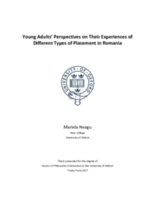Abstract:
This study explores the childhood experiences and transitions to adulthood of 39 Romanian care leavers and adoptees, born around 1989 - 1990. In the past, Romania’s children in care became known to the world as 'the Romanian orphans' and some of them have been subjects to neurodevelopmental research studies focusing on the setbacks posed by institutionalisation in early life. This research project takes a different angle by:
• Using life history approach and therefore capturing the participants’ in-depth accounts of how they recall their childhoods and the challenges they encountered in their transition to independent life;
• Exploring four different types of placements and how they affect transition to independent life, from a user’s perspective.
The fact that Romania undertook reform of the child protection system within the timespan of this generation of children provided a research opportunity to collect the users’ views on different types of placement that belonged to the unreformed system of the 1990s (large residential care and intercountry adoption) and the new types of placement (small group homes and foster care). For comparison purposes, I also included domestic adoption, a type of placement that was less controversial than the others at the time reforms were being introduced. Thus, the types of placement that are analysed through the research participants’ accounts are:
• Residential care (institutions and small group homes)
• Foster Care
• Domestic Adoption
• Intercountry adoption
The study addressed two research questions:
1. How do Romanian born young people who grew up in care understand and narrate their experiences in different types of placement?
2. What narratives of agency are constructed by Romanian-born adults who grew up in different types of placement when they describe their transition to adulthood?
By taking an interpretive stance, this study brings in the academic arena the voices of care leavers and adoptees. By using narrative analysis and focussing on the concept of dignity by employing identity theories, the UN Convention on the Rights of the Child and the Capabilities Approach, the study makes an important contribution to knowledge, with implications for further research, policy and practice.
While interventions in child protection are influenced in each country by cultural, political and socio-legal factors, understanding the basic needs of children who are not raised by their birth families is important across different child protection systems. Therefore, the relevance of the research findings is not limited to Romania.

